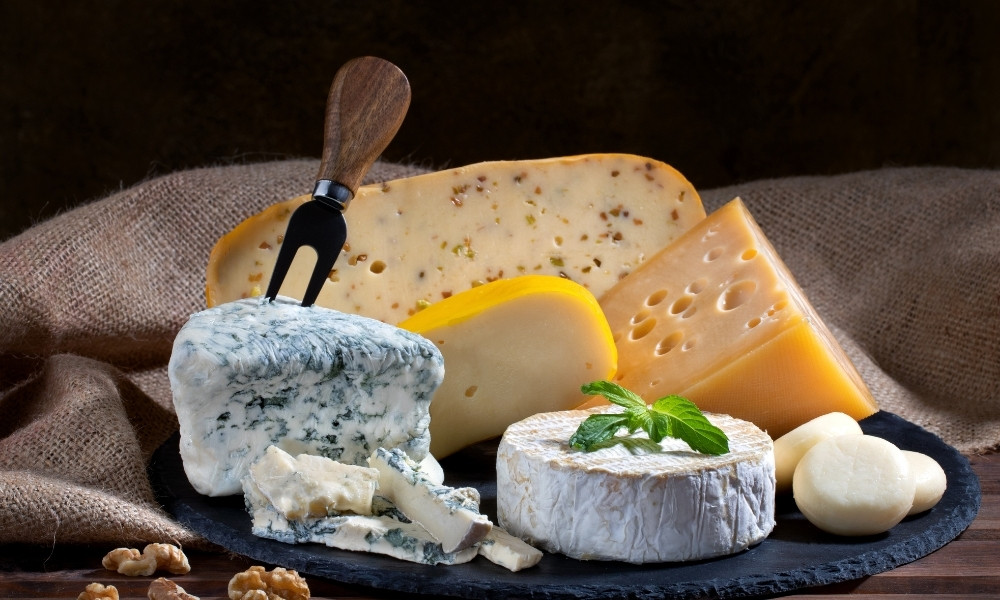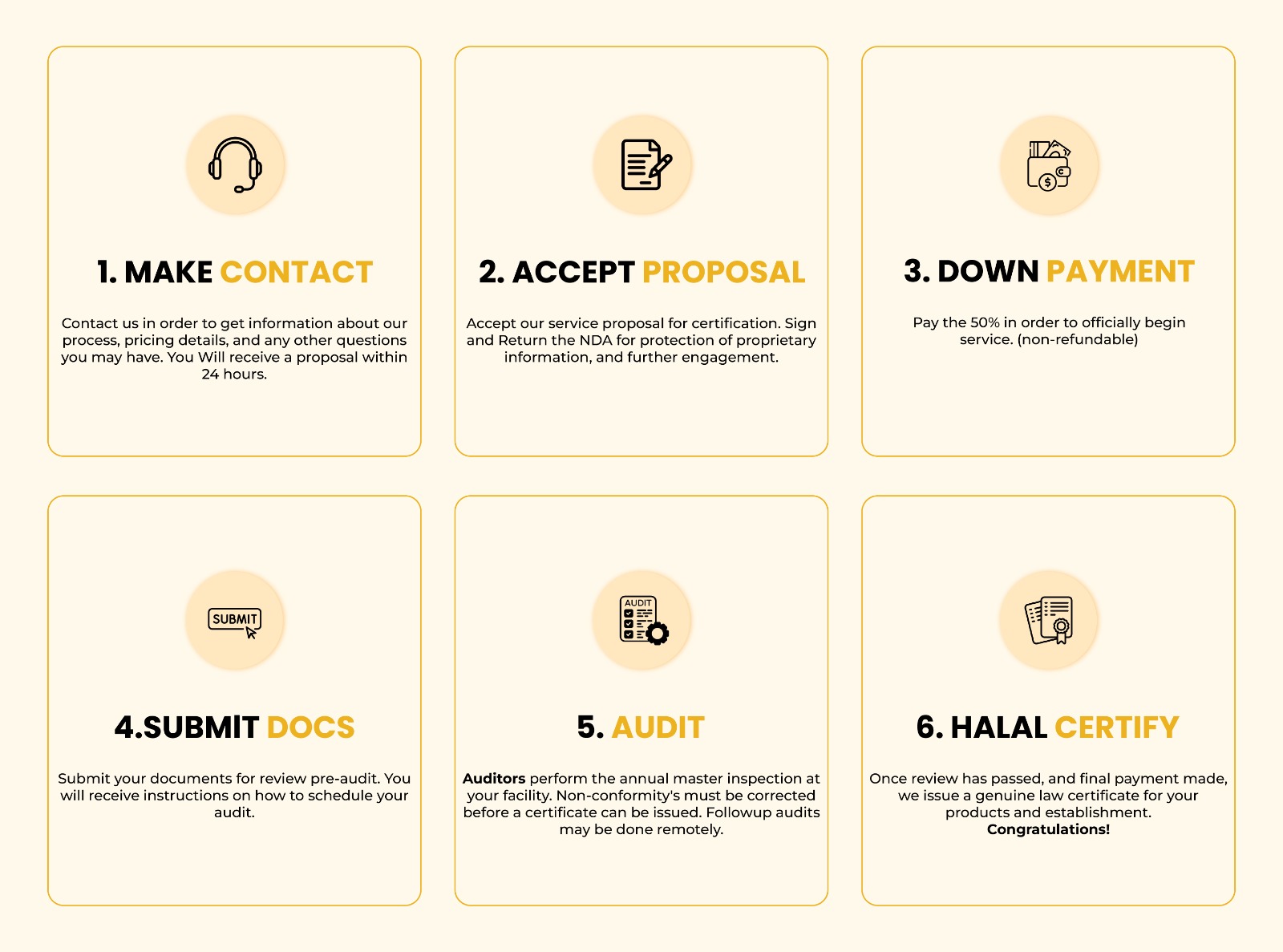
Halal Certification for Dairy Products
Are your dairy products truly halal? The hidden ingredients might surprise you.
If you’re in the cheese or dairy business, halal certification isn’t just a label—it’s a gateway to a massive, growing market of millions of Muslim consumers worldwide who are actively seeking trustworthy products. When you certify your cheese, milk, yogurt, and butter as halal dairy, you demonstrate that your brand understands and respects Islamic dietary principles while meeting the genuine needs of Muslim families.
Whether you are a local manufacturer or a global wholesaler, with the assistance of halal certification for dairy products, you can secure shelf space, earn consumer trust, and grow your business in a competitive food market. But what exactly makes dairy products require halal certification, and why is this investment crucial for your business success?
The Hidden Challenge: Why Some Dairy Products Require Careful Verification
While most dairy products are naturally halal since they come from permissible animals, certain manufacturing processes and ingredients can render specific products haram (forbidden) without proper oversight and certification. The challenge lies in identifying which products require scrutiny and ensuring complete compliance.
Here are the major challenges your business can overcome with proper halal certification:
Rennet in Cheese Production
Most cheese relies on rennet, a key enzyme sourced from calf stomachs. If the animal isn’t slaughtered according to halal principles, the product becomes haram, or unlawful, for consumption.
Important Scholarly Context: Some Islamic scholars hold that rennet and lipase may be permissible even from non-halal sources, based on the understanding that these enzymes are not considered “part of the animal” in the traditional sense, as they are substances through which blood does not flow. This position draws support from the hadith where the Prophet (ﷺ) consumed food from non-Muslim sources. As narrated by Anas bin Malik: “A Jewess brought a poisoned (cooked) sheep for the Prophet (ﷺ) who ate from it” (Sahih al-Bukhari 2617), demonstrating the Prophet’s consumption of food from non-Muslim sources under certain circumstances.
However, there’s a crucial distinction between individual consumption and halal certification standards. While some consumers may rely on this scholarly opinion for personal consumption, halal certification bodies operate under a different mandate entirely.
The Certification Standard vs. Consumer Choice:
- Individual consumers may choose to follow the more lenient scholarly opinion for personal consumption
- Halal certification agencies must apply the highest standards of scrutiny and compliance
- Manufacturers seeking certification specifically request verification that their products meet the most stringent halal requirements
- The certification process exists precisely to eliminate doubt and provide assurance beyond individual scholarly interpretations
When a company approaches us for halal certification, they are explicitly requesting that we verify their products meet comprehensive halal standards—not seeking validation for the more lenient consumer-level permissions. Our certification process addresses this higher standard of assurance that the market demands.
Lipase Enzymes
Found in many cheese products, lipase can come from non-halal animal sources, making sourcing critical. This enzyme can be derived from:
- Animal sources (often from non-halal slaughtered animals)
- Microbial sources (potentially halal if properly sourced)
- Plant sources (generally permissible)
Without proper certification, manufacturers and consumers have no way to verify the source of lipase enzymes, creating uncertainty about the product’s halal status.
Bacterial Cultures in Dairy
Yogurt, kefir, and other cultured dairy items often rely on bacterial starters, which can be grown on non-halal media or alcohol-based solutions. The Prophet Muhammad (ﷺ) said: “Every intoxicant is khamr, and every intoxicant is impermissible” (Sahih Muslim 2003b), which extends to any alcohol used in the production process, even if not present in the final product.
Animal Feed Concerns - The Jallalah Issue
Dairy cows consuming feed with more than 50% impure ingredients (najis) produce non-halal milk. This concept is known as Jallalah—animals that consume more than 50% of their diet from najis (impure) sources. According to authentic hadith, Abdullah ibn Umar said: “The Messenger of Allah (ﷺ) prohibited eating the animal which feeds on filth and drinking its milk (الجلالة)” (Sunan Abi Dawud 3785). The term “Jallalah” refers to an animal that eats filth and impurities, as explained in the hadith commentary.
This means:
- If dairy cows consume feed containing more than 50% impure ingredients (such as animal by-products from non-halal sources, contaminated materials, or other najis substances), their milk becomes haram
- The animal feed composition is absolutely critical to halal certification
- Standard commercial cattle feed often contains ingredients that would classify the animal as Jallalah
Cross-Contamination Risks
Shared production facilities can lead to haram contamination. Proper cleaning protocols are essential for halal compliance. Islamic law requires that equipment contaminated with haram substances be properly cleaned according to specific standards that remove all traces of impurity (color, taste, and smell).
The Solution: Halal Certification for Dairy Products
Our halal certification process addresses every aspect of dairy production:
Complete Ingredient Verification
- Source verification for all rennet enzymes
- Analysis of lipase enzyme origins
- Validation of bacterial culture growing media
- Feed composition analysis for source animals
Supply Chain Transparency
- Farm-to-shelf traceability
- Supplier auditing and verification
- Ongoing monitoring of ingredient sources
- Documentation of halal compliance at every step
Production Process Oversight
- Equipment cleaning protocols
- Segregation procedures for halal production
- Cross-contamination prevention measures
- Staff training on halal requirements
Our Certification Process: Simple, Professional, Reliable
- Initial Application & Assessment Submit detailed information about your products, ingredients, and processing methods. Our experts conduct a comprehensive review of your entire operation.
- Ingredient & Supply Chain Verification Every element—like rennet, lipase, and bacterial cultures—is checked for compliancy.
- Facility Inspection & Process Review On-site reviews ensure equipment, segregation processes, and cleaning protocols meet strict halal standards.
- Certification Issuance Upon successful completion, receive your prestigious halal certification, recognized globally and trusted by Muslim consumers worldwide.
- Ongoing Support & Monitoring Continuous support through regular audits, supply chain monitoring, and immediate assistance with any compliance questions.
Common Dairy Products We Certify
Cheese Products:
- Hard cheeses (cheddar, parmesan, gouda)
- Soft cheeses (mozzarella, ricotta, cream cheese)
- Processed cheese products
- Specialty and artisanal cheeses
Fluid Dairy:
- Fresh milk and cream
- UHT and shelf-stable dairy
- Flavored milk products
- Dairy-based beverages
Cultured Products:
- Yogurt (all varieties)
- Kefir and cultured buttermilk
- Sour cream and crème fraîche
- Probiotic dairy products
Dairy Ingredients:
- Milk powders and proteins
- Whey products
- Dairy-based flavoring systems
- Functional dairy ingredients
The Business Impact: Why This Matters to Your Bottom Line
The global halal food market is projected to reach $2.4 trillion by 2024, with dairy products representing a significant portion of this market. Muslim consumers represent:
- 1.8 billion people globally (nearly 25% of the world’s population)
- $2.1 trillion in annual spending power
- Growing populations in key markets including North America, Europe, and Asia-Pacific
For Muslims, consuming halal products is both an expression of faith and a commitment to following Islamic principles. Allah commands in the Quran (Surah Al-Baqarah 2:168): “O mankind, eat from whatever is on earth [that is] lawful and good and do not follow the footsteps of Satan. Indeed, he is to you a clear enemy.”
This religious obligation creates a non-negotiable demand for properly certified products, making halal certification essential for market access rather than optional.
Taking Action: Your Next Steps
The halal dairy market represents an enormous opportunity that continues to grow year over year. Through our comprehensive halal certification process, we ensure that your dairy products meet the highest Islamic standards, giving you access to billions of Muslim consumers worldwide who are actively seeking trustworthy, certified products.
With proper certification, you can:
- Access new markets worth billions in annual spending
- Build consumer trust through recognized certification
- Differentiate your products in competitive markets
- Ensure compliance with Islamic dietary laws
- Grow your business sustainably and profitably
industries we serve
Is Your Product Ready for Halal Certification?
Get a Free Expert Evaluation Today
Discover if your ingredients, processes, and facilities align with Islamic dietary laws.
Start your Free Halal Compliance Check now — no obligation!

FAQ
Yes, microbial enzymes can be halal if they are derived from permissible sources and contain no cross-contaminants from haram (forbidden) substances. Our certification process verifies the complete production chain for all enzymes.
Cheeses containing animal rennet sourced from non-halal animals or haram additives would not be permissible. Halal certification ensures that such concerns are addressed through comprehensive ingredient verification.
We conduct detailed analysis of feed compositions and farming practices to ensure that source animals consume less than 50% of their diet from impure sources, maintaining their halal status.
We establish rigorous cleaning protocols that meet Islamic requirements for removing all traces of impurity (color, taste, and smell) before halal production begins.
Our halal Certification Process

Testimonials
EXCELLENTTrustindex verifies that the original source of the review is Google. I love it! It’s so helpful and easy to keep track of things we are consuming and making sure everything is halal for us Muslim brother and sisters!Trustindex verifies that the original source of the review is Google. Great and professional organization! Very respectful responsive and really do their thoroughly. We been dealing with them for few years and it has been a great experienceTrustindex verifies that the original source of the review is Google. Great customer services!!Trustindex verifies that the original source of the review is Google. What stands out most about Halal Watch World is its unwavering commitment to integrity and excellence. I’ve seen firsthand how dedicated the company is to providing clients with the best service and ensuring they meet the highest halal standards. If you’re looking for a reliable and trustworthy partner for your halal certification needs, Halal Watch World is the clear choice. It’s a company that truly values quality, professionalism, and making a positive impact in the industry.Trustindex verifies that the original source of the review is Google. A compassionate , conscientious company. Constantly striving to meet the needs of the community. We highly recommend them.

